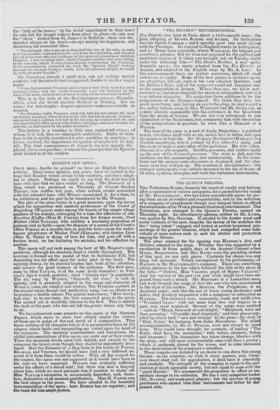THE QUEEN'S THEATRE.
THE Tottenham Rooms, formerly the resort of royalty and fashion, after a succession of various occupants, have passed into the hands
of Mr. MACFARRANE ; who has taken considerable pains, by giv- ing them an air of comfort and respectability, and by the selection of a company of considerable though very unequal talent, to afford the inhabitants of the West a pleasant theatrical entertainment. The Tottenham, now changed to the Queen's Theatre, opened on Thursday night. An introductory address, written by Mr. Lumr, was spoken by Mrs. GLOVER. It alluded to the former royal and noble visitants of the spot, bespoke the favour of the audience for the" rising talent" engaged, and hinted at certain tyrannical pro- ceedings at the greater theatres, which had compelled some indi- viduals of more mature rank to seek for shelter and protection among the Minors.
The piece selected for the opening was HANDEL'S Adis and Galatea, adapted to the stage. Whether this was suggested by a recollection of those golden days of the Ancient Concert when
MARA, BILLINGTON, and Mrs. BATES were the presiding deities
of this spot, we can only guess. Certainly the choice was any thing but fortunate. Totally incompetent to the performance of
HANDEL is Mr. MACFARRA.NE'S company. There was something
rather ominous in the line which followed the title of the piece in the bills—" Galatea, Miss VERNON, pupil of Signor VELLUTI."
And her version of the part was just what might have been ex-
pected from such a school. Mr. BENNETT is a Lancashire man, and went through the songs of Ads like one who was accustomed to the style of his author. Mr. SEGUIN, the Polypheme, is an
Academy pupil ; and, like the rest of those young gentlemen and ladies, very slenderly acquainted with a composer so antiquated as HANDEL. The choruses were, necessarily, weak and ineffective.
"Wretched lovers," with not more than two real singers to a part, was most wretched. Several of the songs were omitted
— such as "Heart, thou seat of soft delight,"" Shepherd, what art thou pursuing," "Consider, fond shepherd;" and their places sup- plied by others both "new and strange" to the piece—the duet of
"Hail, Judea," for instance, from Judas Maccabccus. The added
accompaniments, by Mr. C. POTTER, were not always in good taste. Who would have thought, for example, of loading "The
flocks shall leave the mountains," with horns, clarinets, flutes, and bassoons ? The dramatizer has taken strange liberties with the story, and still more unwarrantable ones with GAY'S poetry ; which is uniformly altered for the worse, and in some instances to the destruction of the composer's intention. These remarks are dictated by no desire to run down this young theatre : on the contrary, we wish it every success, and, when- ever desert shall call for approbation, it shall have it cheerfully and cordially. The strength of the company is equal to the pro- duction of much agreeable variety, but not equal to cope with the "giant Handel." We recommend the proprietor to effect an im- mediate change in his orchestra. He has a very competent leader (Mr. DANDO), and some good players ; but the services of young gentlemen who cannot tune their instruments had better be dis- pensed with.


























 Previous page
Previous page